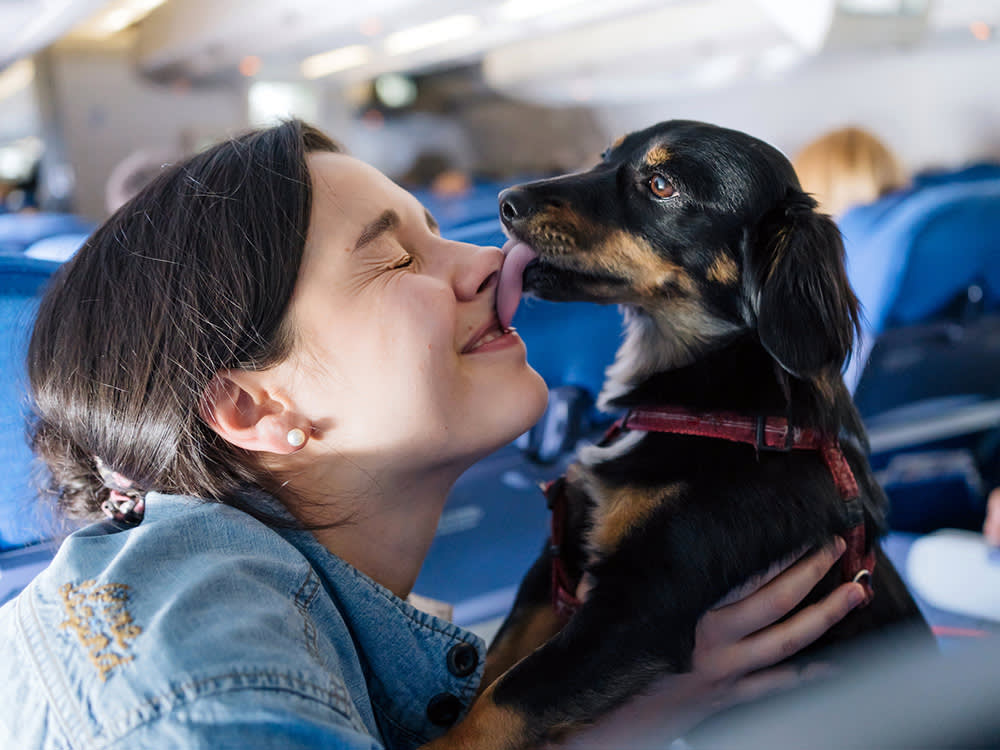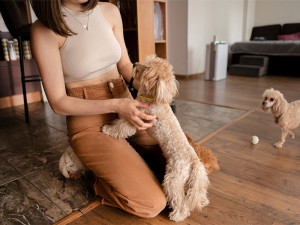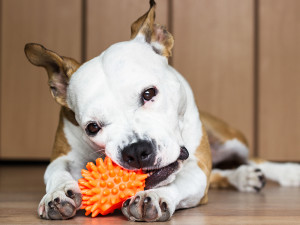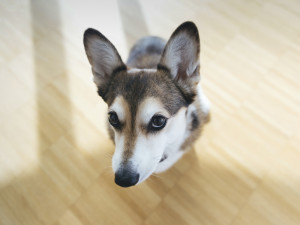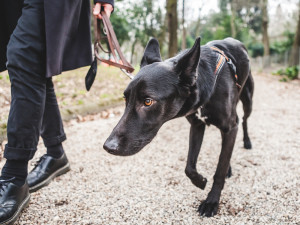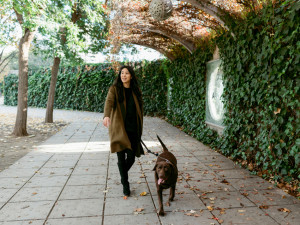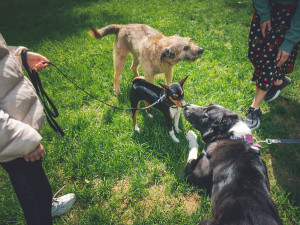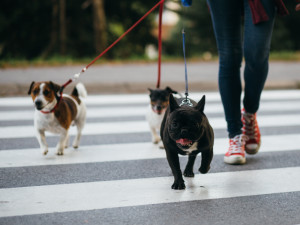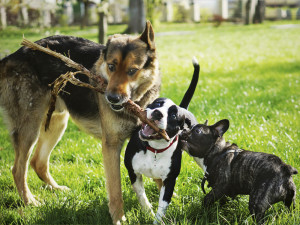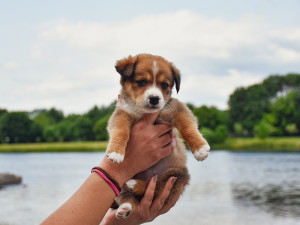Why Does My Dog Lick Me? The Meaning Behind Dogs Licking Us
The sentiment is nice, but...
A slobbery tongue to the face can be a jarring way to wake up – even when the cutest pup in the world is on the giving end. This might leave you wondering, ‘Why does my dog lick me so much?’ It turns out that dogs lick humans for all sorts of reasons beyond just trying to butter you up for treats. One of those reasons is to show affection.
Nevertheless, not all instances of licking should be encouraged; there are also times when licking behaviour in dogs might signal discomfort or become a behavioural concern. Let’s explore all the reasons why dogs lick us. We’ll also provide helpful tips for establishing personal space.
What does it mean when my dog licks me?
Domesticated dogs have been our besties for ages, but they still retain some of their wild instincts, including licking. Licking is an innate behaviour that dogs learn during puppyhood, says Dr Stefanie Schwartz, a board-certified veterinary behaviourist and founder of Civilized Petopens in new tab. It plays an important role in dog-to-dog communication, and it can also give us humans clues about what our dogs need and how they’re feeling.
So what does it mean when a dog licks you, and how do you get them to stop when it gets to be too much? We spoke with Dr Schwartz and other experts to understand this common canine behaviour.
Affection: dogs lick as a way to show affection and love
Puppies are lavished with licks from their very first days. It’s how their mums bond with them, nurture and stimulate them. Because “dogs are affectionate and social creatures”, Dr Schwartz says it’s only natural for adult dogs to express affection for their people in a similar way.
Whether it’s puppy kisses or a cuddle on the couch, Dr Schwartz says it’s important to allow those close interactions while maintaining healthy boundaries. In fact, studies have shown that sharing bonding moments between dogs and humans can lower cortisol levelsopens in new tab – aka stress levels – in both humans and dogs.
Grooming: dogs lick their parents as a way to groom them, just as their mothers groomed them as puppies
Another form of affection, dogs lick their favourite people as a way to groom them, just as they lick and groom each other. This behaviour is called allogroomingopens in new tab, and it’s a way for dogs to show affection, build trust and maintain social bonds.
Attention: dogs may lick people to get attention
A dog who is constantly trying to lick you while you’re busy with another task (like reading this article) might feel left out. Licking as a means of attention-seeking is a behaviour that can easily become reinforced, cautions Dr Rachel Malamedopens in new tab, a veterinary behavioural specialist.
It’s near impossible to ignore a dog soaking you in slobber (more on how to redirect their behaviour below). But if they receive the desired pets, they’ll likely continue licking you – and possibly more frequently.
Boredom: dogs may lick people if they are bored or anxious
Many dogs will excessively lick themselves, you or other objects out of boredom. While any pup can become bored without the appropriate amount of exercise or stimulation, working breeds such as German Shepherds, German Shorthaired Pointers, Golden Retrievers, Great Danes, Irish Setters, Labrador Retrievers, and Pointers are most likely to find other, more destructive, activities to do when they’re under-stimulated.
Saying hello: dogs may lick to greet others
Dogs lick each other and us to say hello. It’s a greeting observed in ancestral wolves that our dogs still do today, says Jen Gumas, a certified professional dog trainer and founder of Wiggles and Woofs Dog Training & Pet Careopens in new tab.
“Wolves returning to the group often lick other wolves as a greeting,” says Gumas. “Sometimes licking the inside of the other wolves’ mouthsopens in new tab to gather information.” That’s why dogs tend to lick your face – or attempt for the mouth. In addition, licking is done by the submissive animal in the dynamic.
Medical reasons: in some cases, licking can be a sign of a medical condition, such as anxiety or allergies
While licking is typically a normal behaviour, it’s important to recognise when a behaviour could signal poor health. If your dog doesn’t just lick your face but is licking odd surfacesopens in new tab such as floors, walls, carpet and furniture, they could have a medical condition such as an underlying gastrointestinal issue.
If you catch your dog constantly licking surfaces, Dr Schwartz says compulsive disorders could be at play. Compulsive disorders occur out of context and may become so troublesome that they interfere with your pup’s normal grooming, eating, sleeping and play activities. Dogs also lick the air when they feel nauseated, adds Dr Schwartz.
Consulting behavioural veterinarians like Dr Malamed and Dr Schwartz is the recommended route for diagnosing and treating compulsive disorders in dogs.
You taste good: sometimes, there’s something on your skin that tastes good
Dogs may enjoy licking our salty skin, particularly in areas with lots of sweat glands like our feet. They might also pick up traces of the food we’re eating or aromas from our meals. Other times, says Gumas, they just want to taste us to figure out where we’ve been.
How do I know if my dog is licking me out of affection?
Does your dog like to lick you as soon as you come home? Cuddle up and lay a wet one on you? What about a puppy kiss as soon as you wake up? Those are all out of affection, says Gumas. Schwartz adds that this is also a submissive greeting. Considering the context of the situation is key to understanding the meaning behind your dog’s slobbery signals.
Can licking be a sign of stress or anxiety in dogs?
“Some dogs tend to lick more when they are nervous,” says Gumas. “Licking can be a way that dogs show another dog that they are not a threat, and sometimes they do this with humans, too.”
There’s also a theory called kiss to dismissopens in new tab. According to the theory, when uncomfortable with something you’re doing, dogs lick as a polite way to request that you stop doing that. For instance, your pup might lick your hand when trimming their nails.
Dr Malamed suggests pups licking the air outside of a positive interaction may express conflict, frustration, anxiety or stress. Either way, paying attention to body language is key. “If a dog is licking you and there are other body language signs that they may be uncomfortable such as a tense body or face, a tucked tail, or a lowered body, it’s best to give your dog some space,” says Gumas.
Can licking transmit diseases from dogs to humans?
As much as we hate to admit it, dogs’ mouths (like all animals’ mouths) are a breeding ground for bacteriaopens in new tab. For most people, being licked by a dog – even near or on the mouth – isn’t a big deal. However, for those who are immunocompromised or have other health conditions that make them vulnerable to infections, it’s a good idea to discourage licking.
How can I prevent my dog from licking me excessively?
If you’d rather a pup not lick you – that’s obviously OK. Just be mindful of how you discourage the behaviour, our experts say. “Punishment can make a nervous dog even more anxious, which ironically can lead to even more licking,” says Gumas. Instead of reprimanding them for their loving behaviour, try one of the following strategies.
Redirect the licking: redirect their attention to something else, such as a toy or a game.
Ignore the licking: if your dog is licking you for attention, try to ignore them. This may be difficult at first, but eventually, your dog will learn that licking will not get them the attention they want.
Teach your dog a ‘leave it’ command: this command can help teach your dog to stop licking as well as other unwanted behaviours.
If the licking is excessive or if you are concerned about a medical cause, see your vet.
Dr Schwartz adds that there are plenty of other ways to show your dog affection, such as speaking to them softly, feeding them complete and balanced meals on a schedule, grooming them and providing them with plenty of play and exercise.
Should I be concerned if my dog suddenly starts licking excessively?
If you notice your dog suddenly starts licking excessively, it’s best to consult with your vet. “Repetitive licking can be a sign of numerous conditions ranging from pain to anxiety to allergies,” says Gumas.
Gumas emphasises not punishing dogs for excessive licking. Dogs who tend to lick their humans excessively are often experiencing anxiety, she says. While some people may dislike their dogs licking them and punish them for it, it can totally backfire. Punishment can make an anxious dog even more anxious, which can lead to even more licking.
Dogs lick for a variety of reasons, including affection, grooming, attention-seeking, boredom, stress and medical conditions. If you’re not comfortable with your dog licking you, there are a few things you can do to discourage the behaviour, such as redirecting their attention, ignoring them or teaching them a ‘leave it’ command. However, it’s important to be patient and consistent with your training, and to avoid punishing your dog, as this can make the problem worse.
If your dog’s licking is excessive or if you’re concerned about a medical cause, it’s best to consult with your vet.
